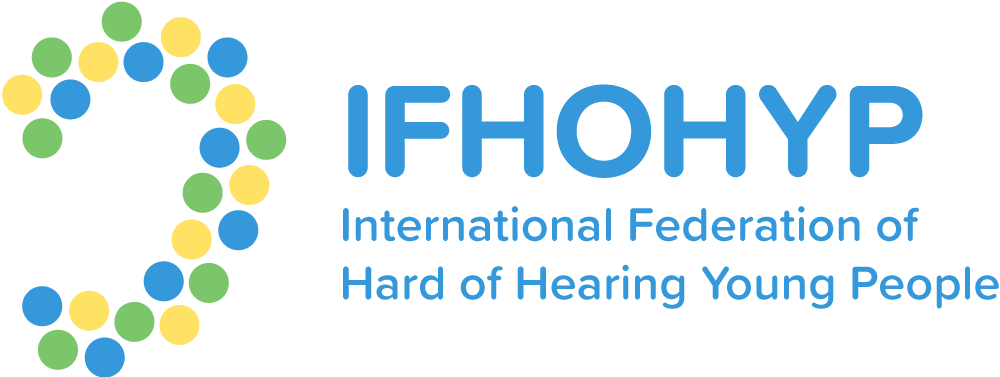Authored by IFHOHYP Accessibility Committee:
IRINA IVANOVA, RUSSIA
VICTORIA ORTON, CANADA
SEY RUBÉN RODRÍGUEZ, BOLIVIA
SEBASTIEN SAFLOR, PHILIPPINES
BOWEN TANG, CANADA
Introduction
The International Federation of Hard of Hearing Young People (IFHOHYP) wanted to collect data on employment situations for deaf and hard of hearing (DHH) persons around the world. As a result, a survey was designed and conducted through Google Form and distributed online to social media pages, Linkedin and the IFHOHYP website. The uniqueness of the survey lies in the fact that it was conducted at the international level and was compiled by DHH youth. It gives a voice to DHH employees and conveys their values in the workplace.
There were 57 survey participants. The IFHOHYP Accessibility Committee recognizes that the data collection methods need to be further developed to reach more participants; however, we still found common themes throughout the survey. This report is a summary of the results of 4 keys areas of the survey:
- Rights and Legislation to Protect DHH Workers
- Gaining Employment as a DHH Worker
- Experiences as a DHH Worker
- Job Accommodations
Demographic Profile
Countries
- Europe: Armenia, Belgium, Denmark, Finland, Holland, Netherlands, Poland, Portugal, Sweden, Switzerland, UK
- Asia: Israel, Japan, Nepal, Philippines
- Americas: Brazil, Canada, USA
- Africa: Nigeria
Age Range: 20 – 62 years old
Major Findings
- The majority of participants who could not afford HA/CI were unemployed and from rural areas, workmen, or late-deafened. Even with the small sample size of participants, we can already give the hypothesis that it may be harder for DHH persons to find employment if they do not have access to hearing technology.
- 88% of participants went to university/college and 84.3% reported full time work. It is hard to provide accurate correlation on the employment rates of DHH persons as there could be many causes of unemployment rates outside of ability.
Survey Data


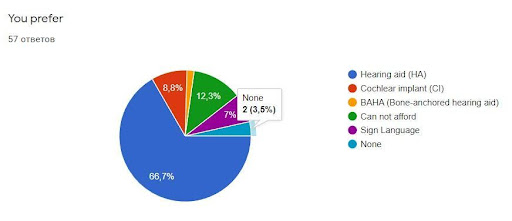

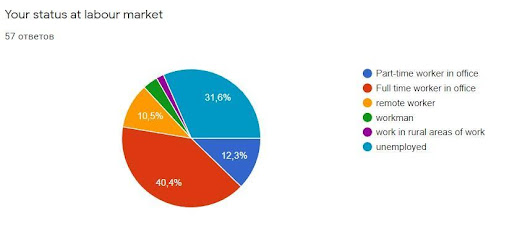
Rights and Legislation to Protect DHH Workers
Major Findings
40.4% of participants partly know or do not know their rights as a worker. Furthermore, 17.5% of participants state that the laws in their country make it hard for them to find work.
|
Medical model of disability |
Social model of disability |
| People are disabled by their impairments or differences. Under the medical model, these impairments or differences should be 'fixed' or changed by medical and other treatments, even when the impairment or difference does not cause pain or illness.
|
The model says that people are disabled by barriers in society, not by their impairment or difference. Barriers can be physical, like buildings not having accessible toilets. Or they can be caused by people's attitudes to difference, like assuming disabled people can't do certain things.
The social model helps us recognise barriers that make life harder for disabled people. Removing these barriers creates equality and offers disabled people more independence, choice and control. |
Survey Data
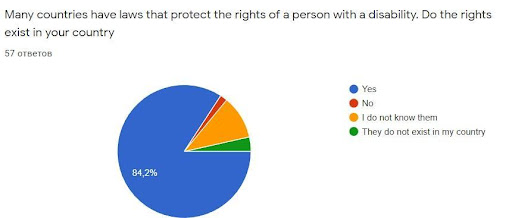
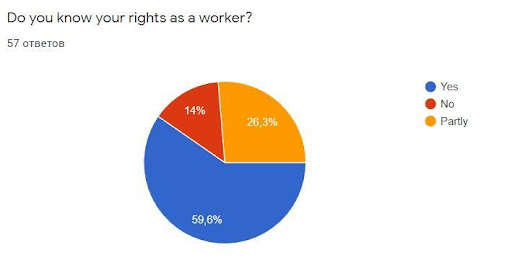
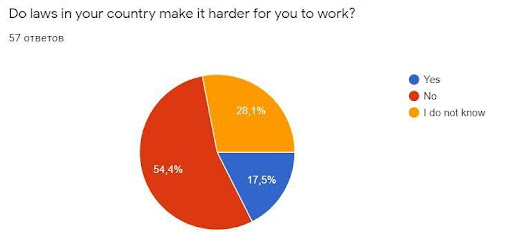
Gaining Employment as a DHH Worker
Major Findings
- 43.9% of employees found employment within a few months, however, that could be from a variety of factors outside of hearing ability.. More comparisons with national averages of employment is needed for accurate data assessment.
- 24.9% of participants were refused a job because of their hearing. It is important to note that there are specific regions, like Latin America or Africa, who are more likely to reject hard of hearing workers because of cultural stigma and discrimination. Thus this result may vary widely depending on the nationality of the participant.
- Many participants stated that communication barriers and prejudice has negatively affected their job (see description in question 2.5 for more details).
Survey Data
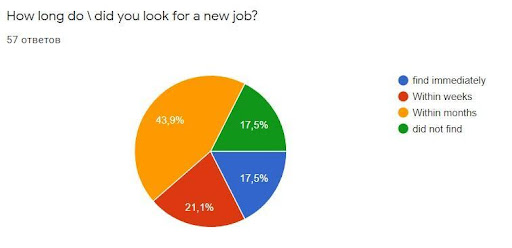
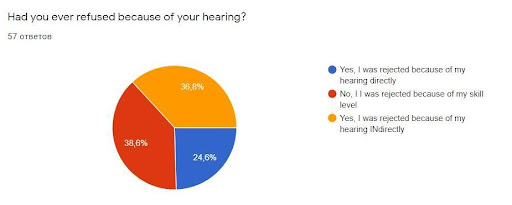
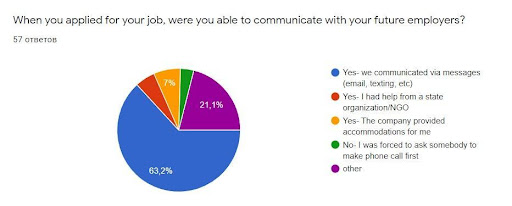
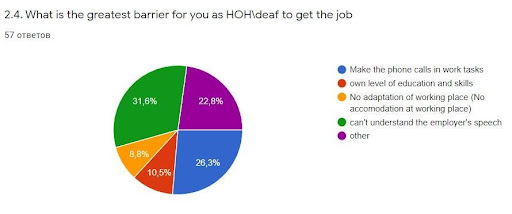
For question 2.5 we asked participants to write about their experiences by answering the question “What ways do you think your hearing loss has affected your job?” Two common themes were seen throughout the responses:
1) Communication (particularly hearing speech) is the #1 barrier in the workplace, with 31.6% reporting it as the hardest part of their job. Many participants discuss this in the responses in question 2.5. Participants also stated that COVID-19 pandemic measures have increased their communications struggles, especially with losing the ability to lip read due to masks. Many participants said closed captioning would help immensely as well.
2) According to the participants’ answers, workplace prejudice occurs commonly for hard of hearing employees. They stated that people avoid them or do not include them in conversations. Some stated that there is a prejudice in their wage due to their hearing loss. This ties into other survey answers as well. Later in the survey 61.4% of participants state that there is not equity in their workplace between hard of hearing and hearing employees.
Examples of comments from participants were as follows:
- “There is exploitation, discrimination and mobbing of disabled workers in Poland. My employer considers me his slave. He thinks that the disabled can work for a minimum wage, because just having a job is a great happiness for them.”
- “Harder to communicate in meetings, boss impatient with accommodations”
“being perceived as less intelligent or "loud" can result in lost promotions/opportunities. Most people forget about my hearing loss so attribute loud speech to being aggressive and lack of understanding to lack of intelligence”
Experiences as a DHH Worker
Survey Data








For question 3.9 we asked participants to write about their experiences by answering the question “What do you like about your job? What do you hate about it?” This question was purposefully vague to avoid survey bias.
Positives in the Workplace
Overall participants like when they are respected as equals, paid a good salary, have opportunities to receive a promotion, and work at a job with inclusionary practices like transcribing or closed captioning. Below is one participant’s response:
“I work for an organization that promotes accessibility and we are always problem solving. I feel respected and I’m asked questions about my own opinion (given a voice) while also given the experience to learn educationally as well. I am highly respected in my workplace and see a lifelong career there with different options. I do experience naive comments from time to time but I try my best to pick my battles and fight for what I think is important. I love how I’m respected, given a voice and encouraged but I also find there is only one of me so sometimes I’m asked for too much which has required me to learn to set boundaries. If I could do it all, I would!”
Negatives in the Workplace
Many participants stated that they disliked being discriminated against, exploited, or taken advantage of due to their hearing loss. Many also said that they felt lonely due to lack of accommodations and/or the global pandemic.
Examples of comments from participants were as follows:
- “I hated they did no accomodation and I felt lonely”
- “some people outright discriminated against me without consequences.”
- “people who are not respectful towards me when they know that I'm deaf hated to be exploited because when there were problems I served as a scapegoat”
For question 3.10 we asked participants to answer the question “What made you decide to stay and work with this company/industry?” This question was also purposefully vague for the exact same reason- we wanted to see the participants’ responses without survey bias in the question. Here are the five most common reason stated by participants, in no particular order:
- Many stated that they prefer workplaces with supportive and inclusive environments. They said that accommodations help DHH workers to feel more comfortable communicating. One participant wrote: “It’s a great career, I enjoy it, my deafness is actually a gain in this career and when I present a problem related to hearing, my supervisor asks what I think will work and provides the necessary materials to support me. For example, live transcribe.”
- Quite a few respondents said that “I am afraid that I will not find another job.” They were afraid of not finding another job so they are stuck at a job which does not include them in any way. Another participant stated “I cannot find myself working in any other industry. That is why my disability is frustrating me.”
- Making at least enough money to afford hearing technology, or having healthcare benefits that will provide them
- Developing a professional reputation and expertise in their field of work
- Feeling uncertain due to the global pandemic
Job Information and Accommodations
Survey Data



https://www.diffen.com/
Most people are familiar with the term equality, meaning each individual or group of people is given the same resources or opportunities. Equity, on the other hand, is less widely understood. Equity recognizes that each person has different circumstances and allocates the exact resources and opportunities needed to reach an equal outcome. For DHH employees, equity is crucial for success in their job. Thus a complete understanding of this term allows DHH workers to better advocate for their rights in the workplace.
For example, if a person requests an accommodation due to a physical limitation, the equitable solution would be to tailor the accommodations to that person’s specific needs. After all, a DHH employee may need different accommodations than a different physical limitation such as mobile limitations, blindness, etc. This different treatment may be the key to reaching equality. Equitable problem solving can fill in the gaps that are often overlooked in the name of equality, because the same answer is not always enough or right for everyone.
As part of question 4.3 we asked participants to define both equality and equity. This question was optional. Since the survey was held in English it may have affected the result, as we are unsure how equity is explained outside of English-speaking countries. This is an area that will require further study from the IFHOHYP Accessibility Committee.
The range of answers was wide from giving the definition until “I do not know”. Below we provide the opinions of participants who gave the definition of difference.
| Equality | Equity |
| everyone is treated equally | everyone is provided what they need to succeed |
| when everyone is given all the same of something and treated all the same way and equity is when people with extra supports are given them to achieve what others without those challenges/difficulties are able to do | is making things the same for everyone; equity is recognizing that people start from different places and have different abilities & opportunities, so treating everyone the same often just reinforces socioeconomic injustice and we need to accommodate to correct for that. |
| everyone gets the same thing regardless of need. | people get different things so everyone is at the same level. |
| everyone has same opportunity but the struggle is the different levels of skill or disabilities each person has to meet that opportunity. | The opportunity is for all, with supports needed so each person can meet the skills/ability level needed to accomplish the opportunity |
| to treat everyone the same | is to treat each one according to their needs to be able to keep up with others. |
| that people are the same. | right, fairness.. |
| same resources or opportunity for all | each has different circumstances, ability and situation |
| is, first and foremost, the equality of all before the law, but taking into account the differences between people - for example, between disabled and non-disabled people. | is a relative, subjective and freely interpretable concept. You cannot impose identical rights and obligations on one and the other - this is equity. |
| everybody gets the same | Everyone is provided with what they need to succeed. |
| similar | justice |
| gives everyone same opportunity | recognizes differences |
| is where everyone is the same with the need for someone to enforce | is a referee or someone making sure everyone is being treated fairly. |
| is generalized to support many. | is more individualized- what that specific person needs |
| is being the same | is being fair. |
| means giving the sames source or opportunities | Equity recognize that each peeps has different circumstances and is it in which fairness should be applied. |




For question 4.8 was an optional question “Do you have any other comments you would like to state in regard to your employment and hearing situation? Positive experiences, worries, frustrations, etc.” Answers were varied. Example of comments are as follows:
- “Getting accommodations got much easier as I moved up from junior level jobs to more professional & management responsibilities. But it was pretty awful when I was younger and working lots of different jobs in retail, construction and nonprofits.”
- “My manager bought everyone transparent masks, and also ask me to prepare a lecture about HR for everyone in the organization 🙂”
- “My employer is not trying to understand that I am hearing impaired. He thinks if I have hearing aids, I should hear like everyone else. And it is impossible to convince him that he is wrong. Zero empathy and understanding.”
- “There are no transparent masks to read lips at work, we don't have applications with live transcription of phone calls, they don't finance equipment to help us work better, they don't take into account that deaf people get tired more and need less working hours”
- “I've worked for companies where they were only politely tolerating my existence, but in truth they did not want me around because I was viewed as a liability or burden they had to bear because it was expected of them.”
Note: for more information on how to get transparent masks in your workplace, please review this website: https://humask.ca/en/products/humask-pro-vision
Global Inventory for Clear/Transparent Face Masks:
https://docs.google.com/document/d/1AisHmXR_GzPQN9m51PgfaqFdK-dMhZmZYA9fgx8rNh0/edit?usp=sharing
Conclusions and Recommendations
This survey shows a need for better communication including more accessible practices in the workplace. It also reveals a great need for equity between hearing and DHH workers. Loss of hearing is an invisible issue but still a serious issue and the main problem is the lack of clear communication between employers, co-workers and DHH persons.
The following recommendations are framed for employers and co-workers:
- Equitable accommodations are needed for DHH persons to perform their duties at work such as Clear masks, sign language interpretation, captioning, etc.
- To perceive the idea that providing reasonable accommodation to a DHH person as an inclusive way to increase efficiency and show their value as a member of the workplace.
- Education for both hearing and DHH workers so there is a better understanding in the workplace.
- In order for a person with disability to be included in the workflow and accepted into the workflow, the efforts of both parties are required. Ask first before helping and giving \ allocate a person to help be integrated in the team.
The following recommendations are framed for DHH workers:
- Raising awareness and self-advocating are important because they are ways to protect yourself and provide yourself with suitable working conditions.
- It is worth raising your level of knowledge about labor legislation in your country to be informed of your rights in the workplace.
- It is important to know and raise awareness about medical and social models of disability and terms of equality and equity. The knowledge can potentially help in conversations with an employer when discussing workplace accommodations.
- Asking for equitable accommodation does not mean you are asking for charity, but to show you want to be an efficient worker and valuable member of the team in the workplace.
